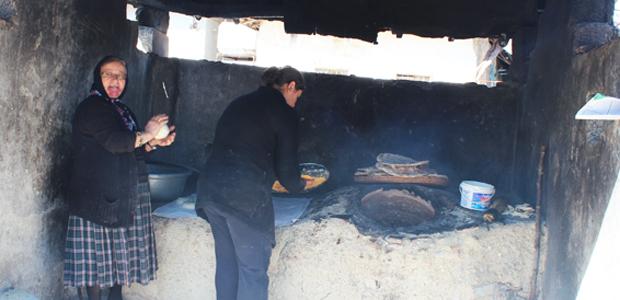In one of Turkey’s most religiously diverse provinces, close ties with Syria fuel support for Assad regime
Women in Tokacli bake bread inside a stone oven, a baking technique common in Syria. (Photo by Matthew Brunwasser.)
It might sound a bit counter-intuitive: an Orthodox Christian priest praying in Arabic, in Turkey.
His church is in Tokacli, one of the few Christian villages in mostly Muslim Turkey.
The priest is swinging an incense burner to chase away the evil spirits. Locals feel like they need the help these days. The village is only a few miles from the Altinozu refugee camp and less than 10 miles from the chaos across the border in Syria. And the government is preparing for the arrival of 20,000 more refugees.
Tokacli, in Hatay province in Turkey, is famous for its ethnic mosaic. This area was part of Syria until 1938.
Some 10 percent of Syria’s population is Christian and there are still thousands left here. People in Hatay are especially sensitive to the troubles next door in Syria. Many support President Bashar al-Assad.
A protest last month drew 3,000 shouting Assad supporters. Askin Demir, a Christian and a farmer in Tokacli, said Syrians need a strong hand like Assad to lead them.
“If you leave them free, they will be like cows in the barn when you don’t lock the door,” Demir said. “They will start running around everywhere and make trouble.”
The conflict, he said, is between freedom for a few and stability for all. The Baath Party, which has ruled Syria since 1963, is solidly secular. And that’s popular with religious minorities. Syria’s population is about 75 percent Sunni Muslim.
“The Christian community wants rule by Assad to continue,” Demir said. “Because when he took power after his father died, Bashar gave the Christians more social rights and opportunities. They were so relieved when he took power. They lived more freely and were happy with their lives.”
Minorities see the Assad regime as representing multi-ethnicity and religious tolerance. And they can’t imagine anyone in a post-Assad Syria giving them a better deal. Just ask Can Coban who owns a cafe here in Tokacli.
“You can’t predict the future,” Coban said. “But let’s say radical Muslims win the elections. The Christians’ lives will never again be normal like they are now. They could expel the Christians or their lives could get more difficult. They might be prevented from praying and practicing their religion. They live better now in Syrian than we do here in Turkey.”
When observers mention the possibility of Syria descending into sectarian war, they’re generally referring to tensions between majority Sunni Muslims and President Assad’s Alawite Islamic sect.
Alawites make up about 16 percent of the population. Sunnis resent them for monopolizing power and so Alawites are terrified of a backlash. In Hatay there are fears of that backlash spreading across the border.
Alawites to make up about 15 percent of the population in Turkey, where they’re known as Alevi. In Hatay Province they make up about half the population. Sefik Kazar teaches at an Alevi foundation in Antakya. He claims that Alawites don’t really control power in Syria. And he suspects that foreign hands are at work stirring the unrest next door.
“People who go to Syria say Assad is an educated and cultured man,” Kazar said. “He studied in England. His wife is also educated and cultured. He is not rough and ignorant. He is not a dictator. He’s not like other strong rulers. There is only one party of course, but it’s not like all the rest.”
If a post-Assad Syria does descend into sectarian war, nowhere in Turkey would feel it more than Hatay. Not only because of their geographical proximity, common Alawite faith and Arabic language, but because the Sunni Muslims, Christians and Alevis in Hatay fear it could unravel their own special multi-ethnic way of life.
